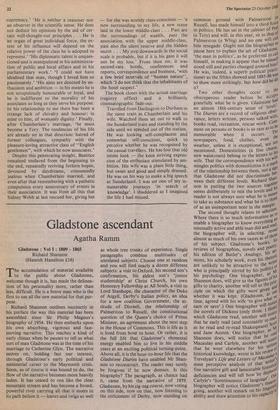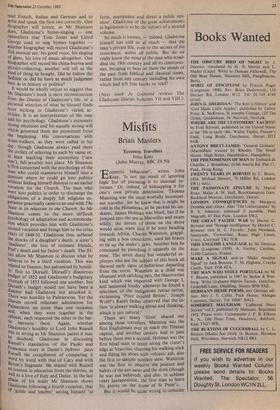Gladstone ascendant
Agatha Ramm
Gladstone : Vol 1 : 1809 - 1865 Richard Shannon (Hamish Hamilton £18)
The accumulation of material available to the public about Gladstone, welcome though it is, has made the delinea- tion of his personality more, rather than less, difficult. He is a brave man who is the first to use all the new material for that pur- pose.
Richard Shannon outlines succinctly in his preface the way this material has been assembled since Sir Philip Magnus's biography of 1954. He then embarks upon his own absorbing, vigorous and fast- moving narrative. This reaches a kind, of early climax when he pauses to tell us what sort of man Gladstone was at the time of his marriage to Catherine Glyn. The narrative moves on, holding fast our interest, through Gladstone's early political and ministerial career to the Maynooth crisis. Soon, as of course it was bound to do, the flow of the narrative becomes more heavily laden. It has ceased to run like the clear mountain stream and has become a broad, powerful river carrying all that it meets in its path before it — leaves and twigs as well
as whole tree trunks of experience. Single paragraphs combine multitudes of unrelated subjects. Choose one at random and you will find nearly a dozen different subjects: a visit to Oxford, his second son's confirmation, his eldest son's 'junior studentship' at Christ Church, his own Honorary Fellowship at All Souls, a visit to Lord Stanhope, the character of the Duke of Argyll, Derby's Italian policy, an idea for a new coalition Government, the at- titude of Disraeli, the relationship of Palmerston to Russell, the constitutional question of the Queen's choice of Prime Minister, an agreement about the next step in the House of Commons. This is life as it is lived from hour to hour. Or rather, it is the full life that Gladstone's elemental energy enabled him to live in his middle years at an exciting political turning-point. Above all, it is the hour-to-hour life that the Gladstone Diaries have enabled Mr Shan- non to reconstruct. The reader may surely be forgiven if he now demurs. Is this biography? The paragraph, as chance had it, came from the narrative of 1859. Gladstone, by his zig-zag course, now voting on this side, now on that, now listening to the enticement of Derby, now standing on The Spectator 23 October 1982 common ground with Palmerston or Russell, has made himself into a third force in politics. He has sat in the cabinet of Peel (a Tory) and will, in this year, sit in that of Palmerston (a Whig) and no one will call him renegade. Ought not the biographer to pause here to explain the art of Gladstone, 'the man in politics', as he preferred to call himself, in making it appear that he himself, stood still and parties changed around On! He was, indeed, a superb political practi- tioner as the fifties showed and 1885-86 was to show more strikingly, but how did he d° it? Two other thoughts occur to the obstreperous reader before he accepts gratefully what he is given. Gladstone had an almost 18th-century sense of 'levels • The Diaries are a record of religious obser" vance, letters written, persons talked with' books read, recreation, rescue work. Corn- ment on persons or books is so rare as to be memorable when it occurs. The newspapers, food, clothes, even the weather, unless it is exceptional, are 01 mentioned. Domesticities (a fine chee,se.: new waistcoats) belong to the letters to DJ,' wife. That the correspondence with his Wlite, mingles politics with domesticities is a
of the relationship between them, not a sign that Gladstone did not discriminate het:• i
ween their different levels. Richard Shan" non in putting the two sources togetne.sr seems deliberately to mix the levels and lilt reader is not always sure what he is me,alik to take as substance and what he is to thin of as an unimportant note in the margt.n* The second thought relates to selection' Where there is so much information as to enable a biographer to know everything !4 unusually active and able man did and read, the biographer will, in selecting, reveal almost as much of his own tastes as of t'his of his subject. Gladstone's books, 1", reviews of biographies, novels and poetT his edition of Butler's Analogy, his seAc mons, his scholarly work, even his rhet°.”er are unlikely to be attractive to the wrItor who is principally stirred by his politicso his psychology. One biographer, as his Shannon does, will give us the figures of gifts to charity, another will tell us the ciple on which the gifts were given ore whether it was kept. (Gladstone, at c)oe ,,,,e time, agreed with his wife 'to give whattice earn or save'.) One biographer will 11°-0 the novels of Dickens (only three, I thIll.c.e which Gladstone read, another will ntid, that he early read (and constantly re'cr'ott as he read and re-read Shakespeare) 3cror and Jane Austen. One biographer, as ,ad Shannon does, will notice that he Lead Macaulay and Carlyle, another will 11°.„'Ijs that he went elsewhere for his sellof historical knowledge, wrote in his revie s Trevelyan's Life and Letters of macaula:e5 most perceptive analysis of that wrIt.cal fine narrative gift and lamentable histoiortreo deficiencies and will tell how he deP 001 Carlyle's 'licentiousness of language • biographer will notice Gladstone's thea,istic going, another will remark on his line to ability and draw attention to his capacity read French, Italian and German and to write and speak the first two correctly. One biographer will notice, as Mr Shannon does, Gladstone's hymn-singing — one remembers that Tom Jones and Lloyd George used to sing hymns together another biographer will record Gladstone's fine musical ear, his good voice, his singing of glees, his love of music altogether. One biographer will record his china-buying and Picture-collecting, another will tell us the kind of thing he bought. Did he follow the fashion or did he have as much judgment here as in history or politics? It would be wholly unjust to suggest that Mr Shannon's book is mere reconstruction from the Diaries of Gladstone's life, or a Personal selection of what he himself finds most striking in Gladstone's varied ac- tivities. It is an interpretation of the man and his psychology. Gladstone's extremely strong emotions and his equally strong will which governed them are prominent from the beginning. His conversations with street-walkers, as they were called in his day, though Gladstone always paid them the civility of referring to each by name or, at least marking their anonymity (`saw One'), fall sensibly into place. Mr Shannon is first concerned with the psychology of the man who could manoeuvre himself into a position where he could go into politics without feeling himself disloyal to an earlier vocation for the Church. The man who went into politics in order to discharge the obligations of a deeply felt religious ex- perience practically came to an end with The Slate in its relations to the Church. So Mr Shannon comes to the more difficult psychology of adaptation and accommoda- tion which provides him with Gladstone's second vocation and brings him to the crisis Years of 1849-51. Gladstone then suffered the shocks of a daughter's death, a sister's Madness', the loss of intimate friends, Peel's death and his father's death. The fif- ties allow Mr Shannon to discuss what he believes to be a third vocation. This was related to finance, but galvanised by hostili- ty: first to Disraeli. Disraeli's disastrous budget of 1852 and Gladstone's budgetary triumph of 1853 followed one another, but bisraeli's budget would not have been a disaster hacl Gladstone not attacked it. There was hostility to Palmerston. Yet the Diaries record reluctant admiration for Palmerston on more than one occasion and, when they were together in the cabinet, each respected the other in the bat- tle between \ them. Again, whether Gladstone's hostility to Lord John Russell was as strong as Mr Shannon paints it may be doubted. Gladstone in discussing Russell's translation of the Paolo and Francesca story in Dante's Inferno pays Russell the compliment of comparing it `Nord by word with that of Cary and with Byron's fragment. He shared with Russell an interest in education from the thirties, as Well as a love of Italy and Dante. In the last Phase of his study Mr Shannon shows Gladstone folloiving a fourth vocation, that Of 'guide and teacher' setting himself `to
form, manipulate and direct a public opi- nion'. Gladstone of the great achievements in legislation is to be the subject of a second volume.
So much is known, — indeed. Gladstone himself has told us so much — that the man's private life, even to the secrets of his conscience, seems all public. But do we really know the mind of the man who strad- dled the 19th century and all its controver- sies, bringing to bear on them the minds of the past from biblical and classical times, rather from any century including his own which had left him books to read?
(Next week Jo Grimond reviews The Gladstone Diaries Volumes VII and VIII.)











































 Previous page
Previous page